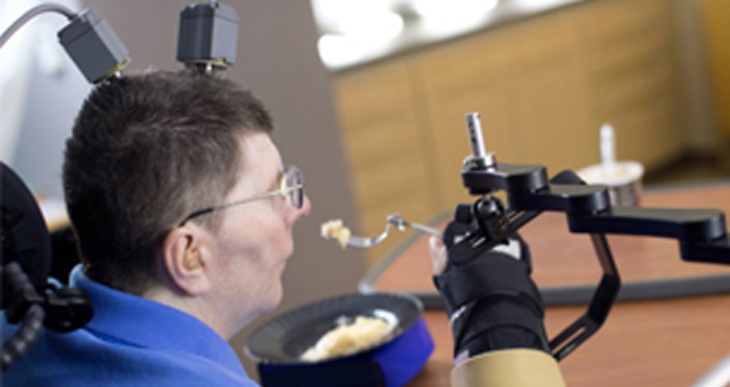When a person has a spinal cord injury, their spinal cord no longer transmits messages from their brain to their muscles for movement. The messages are still drafted and they hit the “send” button, but the spinal cord injury prevents the messages from reaching the intended target. This was the case for U.S. Navy Veteran, Bill Kochevar after his bicycle accident in 2006. He was left completely paralyzed with only the ability to partially shrug his right shoulder.
Now, thanks to Kochevar’s participation in BrainGate2, he can use his right arm to make meaningful movements like scratching his nose, drinking coffee and even feeding himself mashed potatoes. BrainGate2 is a pilot clinical trial being conducted by a consortium of academic, clinical and VA institutions using a brain-computer interface (BCI) and functional electrical stimulation (FES) system to reconnect his brain to paralyzed muscles.
Released March 28, 2017, in The Lancet, this research study is believed to be the first instance in the world of a person with severe and chronic paralysis directly using their own brain activity to move their own arm and hand to perform functional movements.
“For somebody who’s been injured eight years and couldn’t move, being able to move just that little bit is awesome to me,” said Kochevar. “It’s better than I thought it would be.” Eight years of muscle atrophy required exercising the muscles to increase strength, range of motion and endurance to get the full effect of the combined systems.
Kochevar travels just a short distance down the hall from the Cleveland VA’s Long-Term Spinal Cord Injury Unit to participate in the study. He and the researchers benefit from the close proximity between his VA care facility and the FES Center’s VA research lab.
Other studies have shown persons with paralysis moving wheelchairs, cursors on a computer screen and robotic arms. Some studies have even had persons with significantly less paralysis regain hand grasp assistance, but none have involved such a severely paralyzed person regaining the ability to use his own arm. The study results suggest that one day, this technology could make its way to becoming the standard of clinical care for persons with chronic and complete paralysis. The technology could also be applied to other neurological injuries in the future.
BrainGate2 is the combination of the recording and translating capabilities of the brain computer interface (records the pattern of electrical activity and uses mathematical algorithms to decipher the activity into movement commands) and the functional electrical stimulation (FES) system that turns the movement commands into electrical signals that then stimulate the right group of muscles to produce the intended movement.
The BrainGate2 research is led by Case Western Reserve University, the Cleveland Functional Electrical Stimulation (FES) Center at the Louis Stokes Cleveland VA Medical Center and University Hospitals Cleveland Medical Center (UH).
This article first appeared on the Louis Stokes Cleveland VA Medical Center website. Read it here. Video courtesy of Case Western Reserve University.
Topics in this story
More Stories
Army Veteran Jeffery Williams' journey is a testament to resilience, perseverance and the power of innovation in transforming lives.
VA’s latest data shows a decrease in the suicide rate among women Veterans, but more effective interventions and support systems are needed.
Making healthy choices about what you eat and drink is a powerful way to care for yourself. You need the right fuel to feel well and have the energy to do what matters most to you.






Wow, this’ll provide hope for many individuals!
I think it is so unfair that all veterans do not receive the same care when it comes to treatment and the same type prosthetics. i loss both my legs not in combat but i am a vietnam veteran. The prosthetics i have are like something i could have made in my garage. It is not fair.
good for you bill. for what it’s worth, i am very proud of you. i am a navy vet (vietnam). i saw several guys who were injured severley and i wish i could find out how they made out. your story is so enlightning to others that i’m sure you have given someone the push they needed to get themselves well. thanks for your service and keep up the good work.
That is amazing !! Great job guys !
We need to get bladder cancer on the Agent orange list.